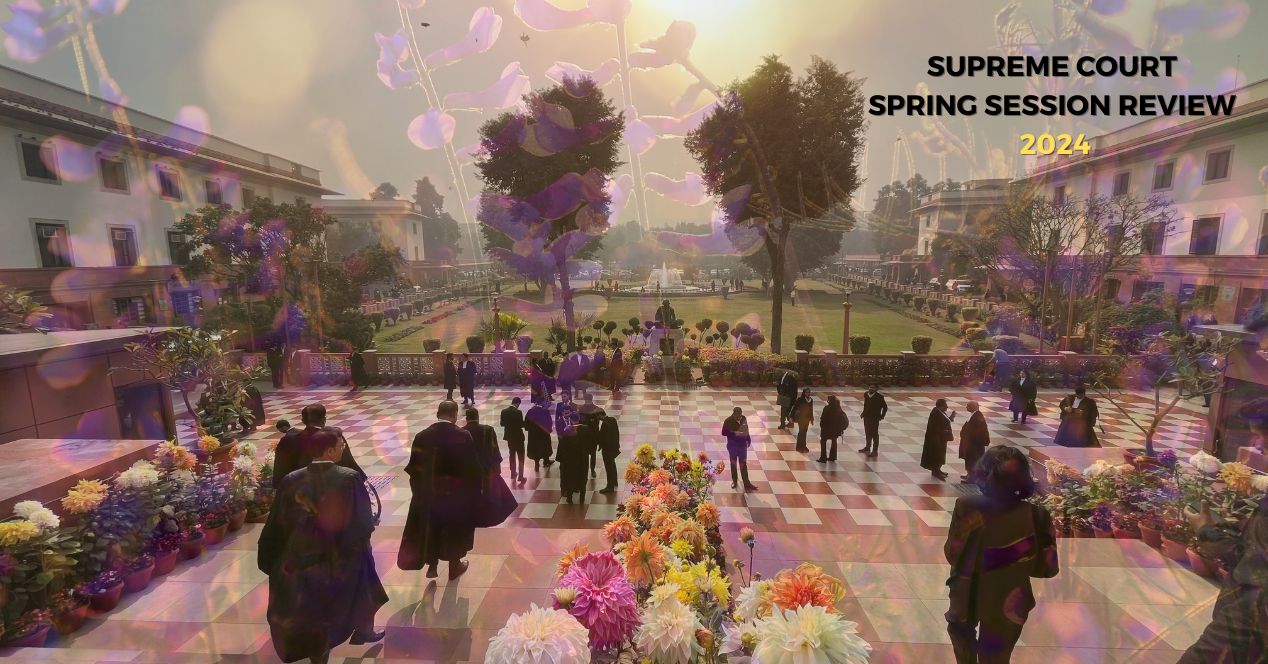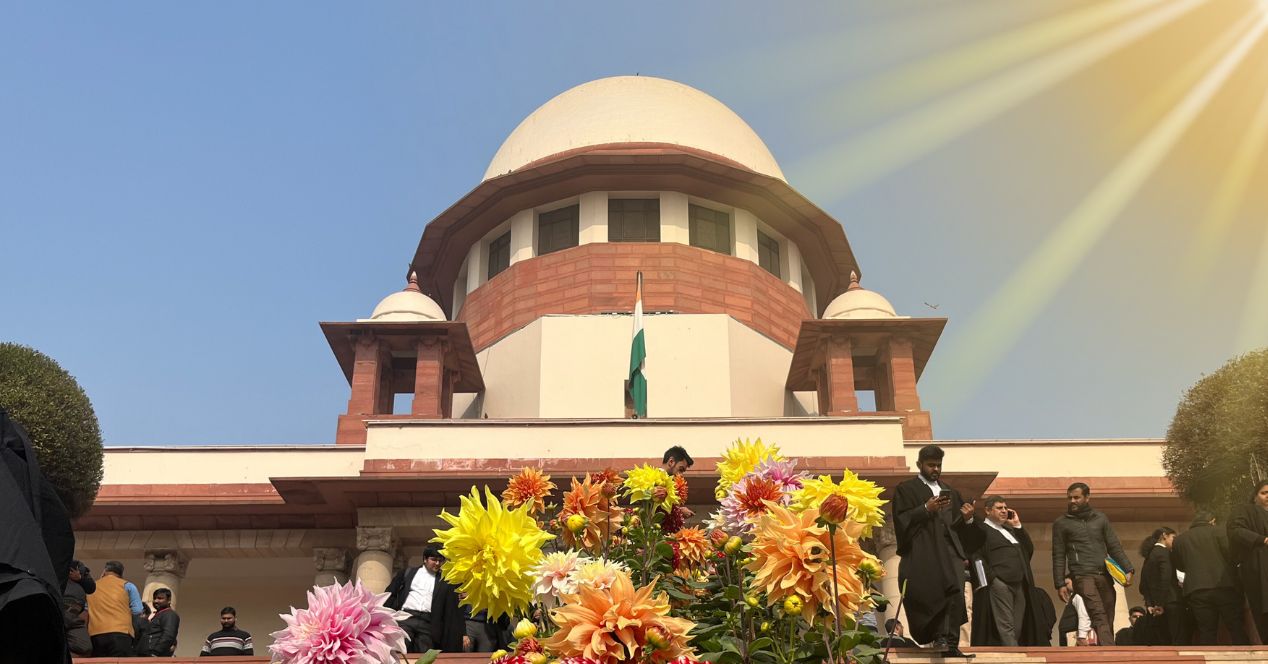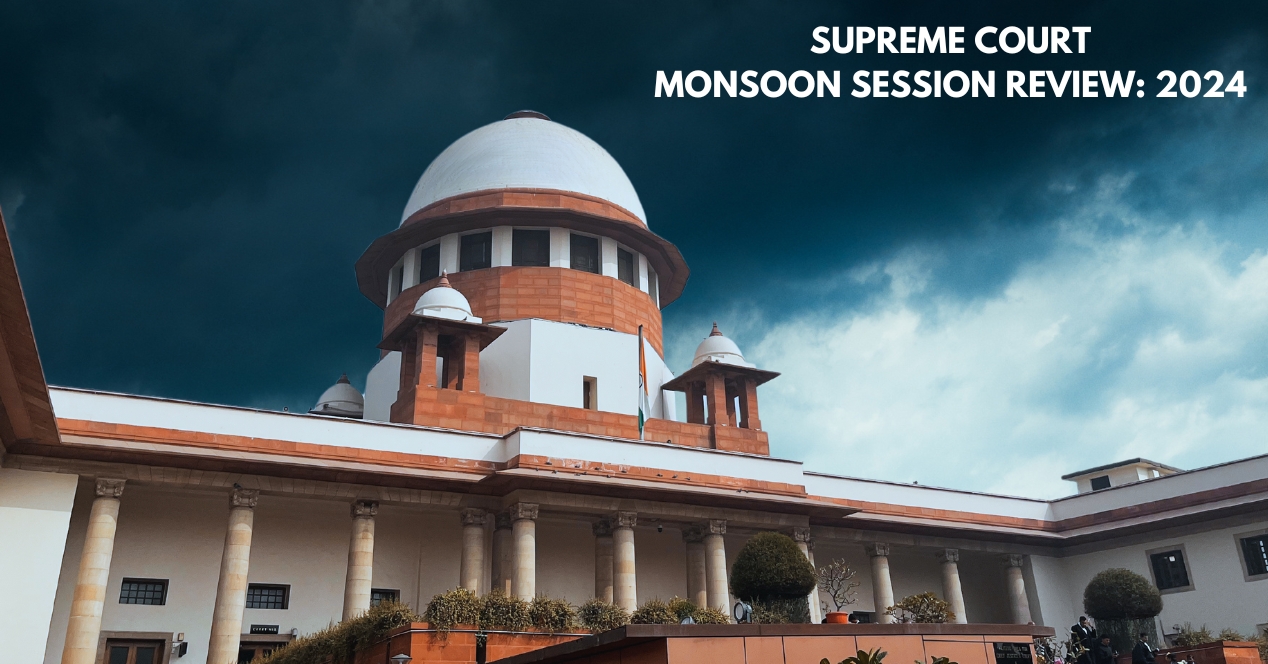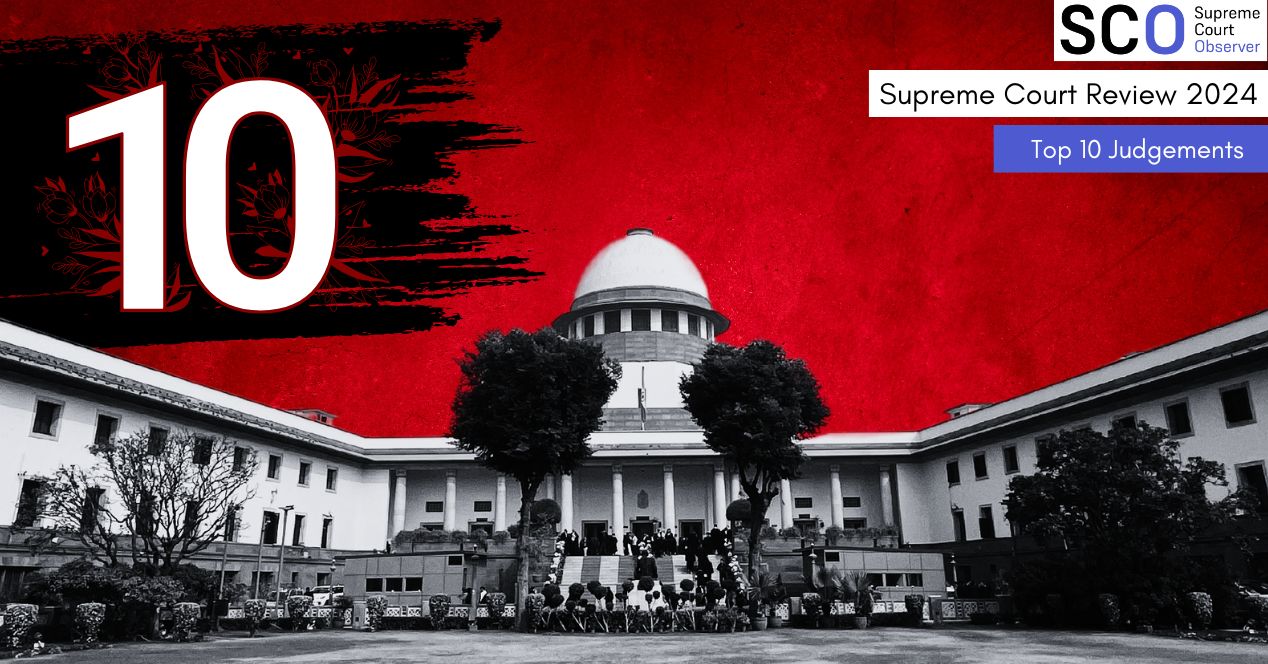Analysis
2024 Winter Session Review
This winter session, the Supreme Court delivered seven Constitution Bench decisions and saw the retirement of Chief Justice D.Y. Chandrachud
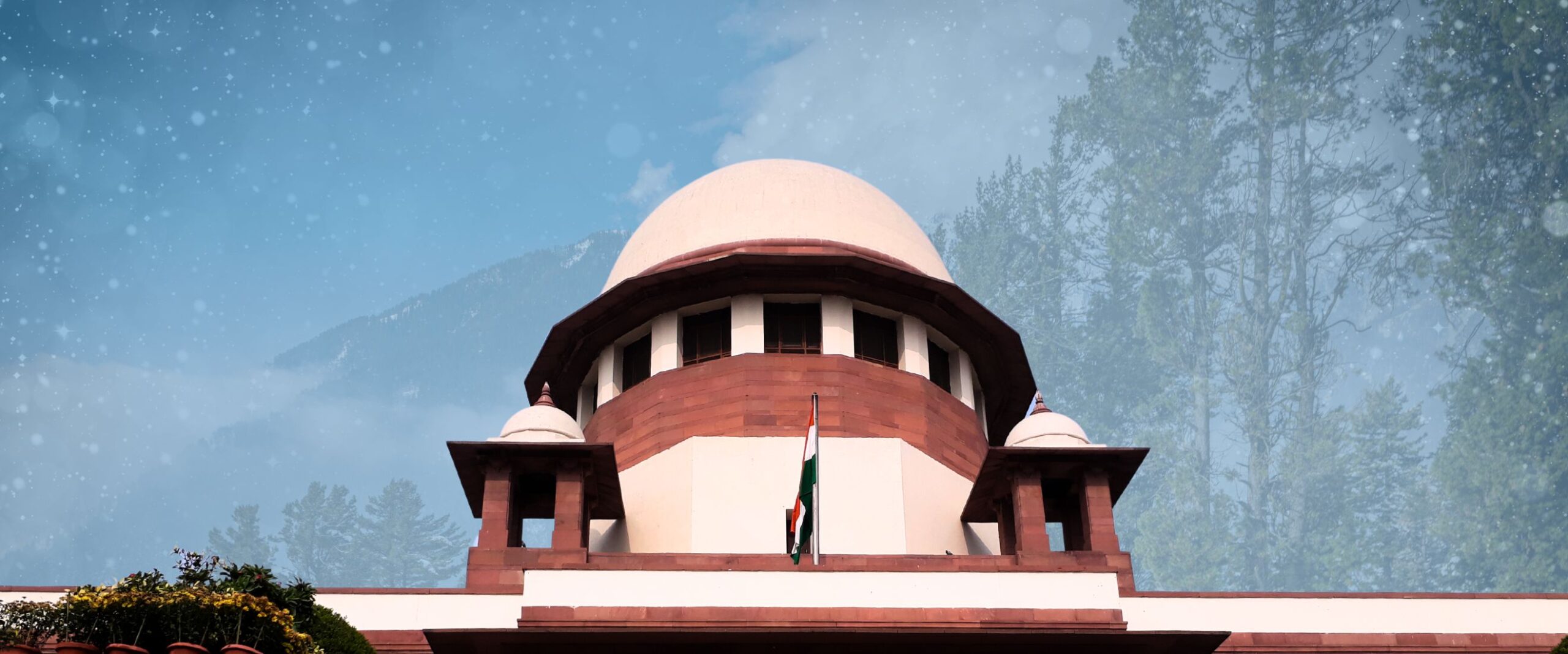
This is a review of the Supreme Court’s Winter Session from 1 October to 31 December 2024.
As the crisp winter air set in, the Supreme Court concluded the year with significant developments and decisions. This winter, the Court delivered seven Constitution Bench decisions and several crucial Division Bench judgements. The Court heard several important cases that will likely see more progress in the coming year.
Chief Justice D.Y. Chandrachud retired this session and passed the baton to Justice Sanjiv Khanna. This transition came with significant administrative overhauls, including reforms in the listing process.
In this seasonal roundup, we dive into the decisions, key hearings, and institutional changes that defined the Winter Session.
Note: The Supreme Court does not have an official session calendar. For analytical clarity, we at the Supreme Court Observer have divided it into four sessions: Spring (January to March), Summer (April to June), Monsoon (July to September), and Winter (October to December).
Quick facts
Working days
The Supreme Court worked for 47 days between 1 October 2024 and 31 December. During this period, the Court observed a two-week-long break—one week each for Dushhera and Diwali and a 10-day-long Christmas and New Year break.
Quorum
By the time the Winter Session concluded, the Court had a working strength of 33 judges out of the sanctioned strength of 34 judges.
Appointments and retirements
In November, former Chief Justice D.Y. Chandrachud retired from the top court. He was succeeded by CJI Sanjiv Khanna. CJI Chandrachud’s retirement brought the working strength down to 32 judges. The Supreme Court Collegium, led by CJI Khanna recommended Justice Manmohan, who was appointed in the first week of December. A vacancy remains to be filled.
Constitution bench decisions
- Validity of Section 6A of the Citizenship Act, 1955—five-judge bench—judgement delivered on 17 October 2024
- States’ power to regulate industrial alcohol—nine-judge bench—judgement delivered on 23 October 2024
- Nature of Private Property—nine-judge bench—judgement delivered on 5 November 2024
- Validity of ‘Light Motor Vehicle’ Licence to Drive ‘Transport Vehicle’—five-judge bench— judgement delivered on 6 November 2024
- Altering rules for appointment to public posts—five-judge bench—judgement delivered on 7 November 2024
- Aligarh Muslim University’s minority status—seven-judge bench—judgement delivered on 8 November 2024
- Appointment of arbitrators by ineligible persons—five-judge bench—judgement delivered on 8 November 2024
Constitution bench hearings
The Court did not hear any new Constitution Bench cases during the Winter Session. The last hearing took place in August 2024 in the case determining the appointment of arbitrators by ineligible persons.
Pendency
- 23 five-judge matters are pending, with 262 tagged matters.
- 5 seven-judge matters with 35 tagged matters
- 3 nine-judge matters with 69 tagged matters
Total pendency: 82,972
Note: This data was collected from the National Judicial Data Grid on 31 December 2024 at 2.40 pm.
Constitution Bench decisions
Fraternity, not exclusivity
On 17 October, a Constitution Bench, in a 4:1 majority, upheld the constitutionality of Section 6A of the Citizenship Act, 1955. The provision granted citizenship to migrants who entered Assam from Bangladesh before March 1971.
The Court clarified that Section 6A was solely applicable to pre-1971 migrants. Acknowledging poor implementation, it ordered Supreme Court-supervised hearings to identify and deport post-1971 entrants. The majority rejected claims that Section 6A eroded Assam’s culture, stating that the Constitution promoted fraternity over cultural exclusivity. Justice J.B. Pardiwala dissented, deeming Section 6A unconstitutional due to “temporal unreasonableness.” He also observed that delays in deportation facilitated migration into the state.
Upholding the “spirit” of fiscal federalism
On 23 October, a nine-judge bench, in an 8:1 majority, endorsed the state government’s power to tax industrial alcohol under Entry 8 of the State List. The bench overruled a 25-year-old decision in Synthetic Chemicals v State of Uttar Pradesh (1989). In that case, a seven-judge bench had held that the power was only restricted to “intoxicating liquor” i.e. recreational alcohol used for consumption.
Justice B.V. Nagarathna dissented from the majority stating that taxing industrial alcohol would lead to an unequal taxing regime. She held that the economic importance of industrial alcohol requires it to be under the Union government’s control.
An alive Article
On 5 November, nine judges of the Court ruled that the original version of Article 31C, which protects laws made under Article 39(b) and (c) from fundamental rights challenges, remains valid. The Court clarified that after the amendment expanding Article 31C to cover all directive principles was struck down in Minerva Mills v Union of India, the original version as upheld in Kesavananda Bharati v State of Kerala was revived.
In an 8:1 decision, the judges also held that not all private property qualifies as a “material resource of the community” under Article 39(b) of the Constitution. Property may attain the status of a material resource through nationalisation, acquisition, or donation, serving the common good.
To have and to drive
A five-judge bench unanimously held that a person with a light motor vehicle license is eligible to drive a transport vehicle of less than 7500 kgs under the Motor Vehicles Act, 1988. The bench also directed the Union government to propose amendments in the Act which can clarify the confusion that the separate eligibility requirements for transport vehicles apply to medium and heavy transport vehicles (more than 7500 kgs).
One simply cannot bend the rules
The Supreme Court unanimously held that public sector employers cannot modify recruitment rules after the process has commenced. The Court clarified that while employers have the discretion to frame rules to identify suitable candidates, benchmarks for evaluation must be established before the recruitment process begins. Recruiting authorities must adhere to existing rules, regulations and constitutional principles throughout the process.
Criteria for a minority institution
A seven-judge bench, in a 4:3 majority, laid down parameters to determine whether an educational institution qualifies as a minority institution under Article 30. The majority struck down the five-judge decision in Azeez Basha v Union of India (1967), which denied Aligarh Muslim University (AMU) minority status. It held that Article 30 applies to institutions established before the Constitution. It distinguished the “establishment” of an institution from its “incorporation.” It held that government intervention to pass an “incorporating statute” does not nullify minority character. AMU’s minority status will now be considered by regular benches of the Court based on the parameters.
Equality in arbitration
A five-judge bench held that arbitration clauses allowing unilateral appointments to arbitral tribunals were invalid. It held that the principle of equal treatment applies from the stage of selecting the panel of arbitrators. The majority, led by former CJI Chandrachud, ruled that unilateral appointments violated Article 14 of the Constitution. In a partial dissent, Justices Hrishikesh Roy and P.S. Narasimha noted that equality among parties is embedded in the Arbitration Act and cautioned against applying constitutional principles to private arbitration matters.
Notable Division Bench decisions
No discrimination during incarceration
On 3 October 2024, the Supreme Court ordered the Union and states to revise prison manuals to eliminate caste-based discrimination in prisons. It held that the manuals violated Articles 14, 15, 17, 21, and 23. It also directed amendments to the Model Prison Manual 2016 and the Model Prisons Act 2013 within three months. The judgement came in a petition challenging discriminatory practices such as caste-based labour segregation, barrack segregation, and stereotyping of Denotified Tribes in prisons in India. The Court noted that these practices perpetuate systemic discrimination, untouchability, and forced labour. In November, the Court recalled a part of the judgement which directed the deletion of caste columns in prison registers. The caste columns were useful in predicting the caste representation in prisons.
Education rights for minorities
In November 2024, the Court partly upheld the constitutional validity of the Uttar Pradesh Board of Madarsa Education Act, 2004. It overturned an Allahabad High Court judgement which struck down the Act and directed the shutting down of 16,000 Madarsas across Uttar Pradesh. The Court highlighted the concept of “positive secularism,” which requires the State to “treat some persons differently to treat all persons equally.” However, it struck down provisions which regularised degrees such as ‘Fazil’ and ‘Kamil’, equivalent to bachelors and masters for being inconsistent with the University Grants Commission Act, 1956.
No demolition of the rule of law
On 13 November, the Supreme Court declared government-sanctioned bulldozer demolitions of properties as unconstitutional. The bench led by Justice B.R. Gavai held that such demolitions violate natural justice, the right to shelter under Articles 19 and 21, and the separation of powers. The judgement noted that demolitions of properties belonging to persons accused of crimes undermine the rule of law and inflict collective punishment on innocent families. It issued pan-India guidelines which mandated a 15-day notice period prior to a demolition of an encroached property, personal hearings from a district magistrate, and detailed documentation. Any violations of these guidelines, the Court said, would result in contempt charges and personal liability for officials.
Notable Division Bench hearings
Guidelines for doctor’s safety nearly complete
The Supreme Court continued hearing the suo moto petition of the R.G. Kar Hospital rape and murder case throughout the winter session. The Supreme Court-appointed National Task Force submitted its pan-India guidelines for doctor’s safety. State governments, union territories and stakeholders such as the Senior and Junior Doctor’s Associations, were directed to respond to the task force’s report. The next hearing is expected to take place in March 2025.
Marital rape hearings deferred
The Court adjourned petitions challenging the marital rape exception under Section 375 of the Indian Penal Code, 1860. The petition was adjourned due to CJI Chandrachud’s retirement. It will now be heard by a new bench. With regular hearings set to resume in January 2025, it is expected that the case may be listed during the next session.
Fair division
On 6 November 2024, a Supreme Court bench of Justices Nagarathna and Pankaj Mithal began hearing petitions challenging Section 15 of the Hindu Succession Act, 1956. This provision directs the property of a Hindu woman dying intestate to devolve first on her husband’s heirs before her own parents. Senior Advocate Meenakshi Arora argued this was discriminatory, citing the example of Omprakash v Radhacharan (2009), where a widow’s property went to her dead husband’s nephew instead of her parents. The Court detagged unrelated petitions and directed the Union to submit counter-arguments.
Delivering social security
The Supreme Court briefly heard the Indian Federation of App-Based Transport Workers’ (IFAT) plea to recognise gig workers as “unorganised workers” under the Unorganised Workers’ Social Welfare Security Act, 2008. The case was adjourned after it was noted that none of the involved Union ministries had filed their replies. Justices Dipankar Datta and P.K. Mishra granted a final deadline of 17 December 2024 for responses and 9 January 2025 for rejoinders.
Airing out the pollution crisis
The Supreme Court issued guidelines to address the ongoing air pollution crisis in Delhi-NCR. The Bench reprimanded authorities and state governments for failing to implement emergency measures effectively and enforce Stage IV restrictions under the Graded Response Action Plan (GRAP). In response to the crisis, the Court halted construction activities, restricted non-essential truck traffic into the region, and appointed Court Commissioners to monitor entry points into the city. Once air quality levels improved, the Court shifted its attention to longer-term measures, such as solid waste management, to prevent recurring environmental issues.
Rehabilitation efforts in Manipur
The Supreme Court directed the Manipur government to submit detailed reports on properties destroyed, looted, or encroached upon during the ethnic violence between the Meitei and Kuki-Zo communities. The Court also sought clarity on rehabilitation measures, including the use of mesne profits to be paid to owners of encroached properties. It allowed petitioners to access semi-redacted reports from the Justice Gita Mittal Committee, which oversees relief efforts in Manipur. The Manipur government was urged to release funds for victim housing and to submit details on recovered arms and ammunition.
No more surveys…for the time being
On 12 December 2024, a Special Bench led by CJI Khanna heard petitions challenging the validity and seeking the implementation of the Places of Worship Act, 1991. The Court stayed the registration of further suits demanding surveys of religious sites until the Act’s validity was determined. It also barred district courts from passing interim or final orders. The Union government was granted four weeks to respond to the pleas. Nodal counsels were appointed to streamline the proceedings, with the next hearing scheduled for 17 February 2025.
Court news
Chief Justice D.Y. Chandrachud retires
On 10 November, former CJI Chandrachud retired from the Supreme Court after an eight-year tenure. To mark the occasion, we published articles highlighting his top 10 judgements, seven dissents, and the 16 Constitution Bench matters listed during his tenure as CJI. We also analysed his tenure, focusing on his public appearances, efforts to reduce pendency, collegium activity, and contributions to disability and arbitration jurisprudence. He was succeeded by CJI Khanna who took over from 11 November.
Change in the rules of the“listing game”
In September this year, we published a reported story on the several issues plaguing the process of listing cases at the Supreme Court. When CJI Khanna took over in November, he made two announcements. First, he temporarily halted listing regular matters to address the pendency of cases. Second, he announced that all cases would be listed within no more than 10 days from the time of the date given.
Shortly after the first announcement, we reported that the move was aimed at reducing the backlog of pending cases in the top court. Notably, the majority of cases in the Court’s docket were miscellaneous matters (over 60,000). Recently, CJI Khanna clarified that regular matters (over 20,000) will be listed starting from January 2025.
New drop in our Supreme Court@75 series
In our series commemorating 75 years of the Supreme Court, we published Shreya Rastogi and Neetika Vishwanath’s article on the death penalty jurisprudence in India. The article highlights Justice P.N. Bhagwati’s powerful dissent in Bachan Singh v State of Punjab, where a four-judge majority on a five-judge bench upheld the death penalty in “rarest of the rare” cases. The debate over the death penalty resurfaced during the winter session when the Supreme Court issued guidelines to streamline the process for deciding mercy petitions in death sentence cases. In our newsletter, we discussed how the decision acknowledges much-needed procedural reforms in the death penalty law.
Supreme Court Review 2024
As 2024 closed, we reflected on the Supreme Court’s activity over the year. Our year-end reviews featured the top 10 judgments of 2024, Constitution Bench decisions, and thematic articles on key topics like federalism, child rights, elections and democracy, religion and culture. In our Court Data story, we found that the Supreme Court took up the highest number of suo moto cases this year. Additionally, we at SCO also shared our personal favourite judgments in a special newsletter, so don’t forget to check that out here.
Stay tuned for more in-depth articles and stories in 2025!

